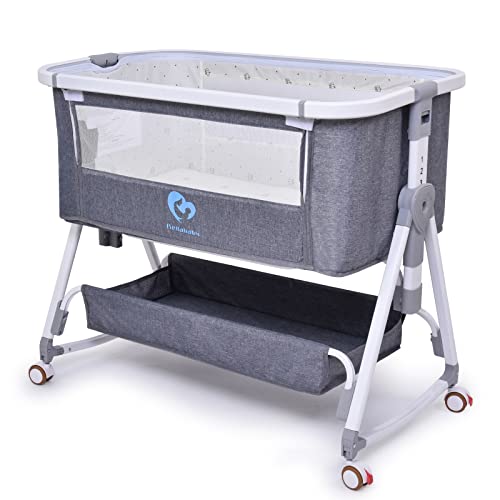What Freud Can Teach Us About Bedside Cot For Close Bonding
Bedside Cot for Close Bonding: Enhancing Parent-Child Connection
Introduction
The arrival of a newborn is a momentous celebration that's accompanied by a wealth of wondrous emotions and newfound duties. As parents navigate the myriad of choices they face, one important factor to consider is where their baby will sleep throughout those early months. A bedside cot, likewise referred to as a co-sleeper, has emerged as an increasingly popular choice amongst caregivers seeking to cultivate close bonding with their infants while making sure safe sleep practices. This post explores the benefits of utilizing a bedside cot, its effect on bonding, safe sleeping practices, and essential considerations for parents or guardians.
- * *
What is a Bedside Cot?
A bedside cot is a type of crib that is firmly connected to the side of the adult bed, making it possible for parents to have their newborn close at hand throughout the night. This setup permits easy accessibility without having to rise, thus improving nighttime feeding and calming experiences.
Types of Bedside Cots
Connected Co-Sleepers: These designs attach straight to the parent's bed and provide a protected sleeping environment for the infant while maintaining easy access for feeding and comfort.
Freestanding Bedside Cots: Operated as a separate system but placed surrounding to the bed, these cots offer private sleeping locations while still permitting nearness.
Convertible Bedside Cots: These versatile models can adapt as the child grows, transforming from a cot to a toddler bed or play location, extending their use.
- * *
Advantages of a Bedside Cot for Close Bonding
Making use of a bedside cot not only assures benefit but also supports a special bond between parents and their children. Here are some key advantages:
Facilitates Immediate Response: Proximity permits caregivers to react promptly to the baby's needs, whether for feeding, calming, or comfort, therefore establishing security and trust.
Promotes Breastfeeding: Nighttime breastfeeding ends up being easier when the baby is within reach, assisting in a more natural feeding routine.
Reinforces Emotional Connection: Close physical existence can improve the emotional bond through skin-to-skin contact and mother-infant interactions during nighttime awakenings.
Encourages Sleep Synchronization: Being near each other can assist regulate the infant's sleep patterns to closely align with those of the parents.
Minimizes Sleep Disruption: With the baby close by, parents might sleep better, knowing they do not have to leave their bedside to address their baby.
Table 1: Benefits of Using a Bedside Cot
Benefit
Description
Immediate Response
Quick access to the baby for feeding or reassuring.
Promotes Breastfeeding
Easier to breastfeed at night due to distance.
Enhances Emotional Connect
Fosters emotional bonds through frequent contact.
Encourages Sleep Synchronization
Assists both parent and baby to establish synchronized sleep patterns.
Decreases Sleep Disruption
Lowers nighttime awakenings for parents.
- * *
Safe Sleep Practices
While bedside cots provide various benefits, parents should ensure the baby's sleep environment adheres to security procedures. Here are some important security pointers:
- Firm Mattress: Ensure the cot has a company mattress that fits snugly to avoid any gaps where the baby might become trapped.
- Sids Prevention: Place the baby on their back to sleep, which pleases the most important suggestion to prevent Sudden Infant Death Syndrome (SIDS).
- Keep Bedding Minimal: Use a fitted sheet and keep other bed linen to a minimum to avoid suffocation dangers.
- Maintain Distance: Ensure the cot is firmly connected to your bed, lessening the risk of falls.
- Limitation Soft Objects: Keep soft toys, pillows, and blankets out of the cot to provide a safe sleeping environment.
Table 2: Safe Sleep Practices for Bedside Cots
Safety Tip
Description
Firm Mattress
Use a company bed mattress that fits snugly into the cot.
SIDS Prevention
Always place the baby on their back to sleep.
Keep Bedding Minimal
Limit bed linen materials to prevent suffocation threats.
Preserve Distance
Guarantee the cot is securely protected to the adult bed.
Limit Soft Objects
Get rid of soft toys and pillows from the sleeping location.
- * *
Factors to consider Before Choosing a Bedside Cot
Selecting the right bedside cot needs deliberation and consideration of different factors:
- Size: Ensure the cot fits comfortably together with your bed without compromising space.
- Ease of Use: Look for designs that are user-friendly and simple to operate, particularly during nighttime feeding.
- Security Features: Safety straps and locking systems should be in location to prevent unexpected detachment.
- Material Safety: Choose non-toxic, baby-friendly materials with certified security standards.
Often Asked Questions (FAQs)
1. Is it safe to use a bedside cot?Yes, bedside cots can be safe when correctly connected to the adult bed and utilized according to safety guidelines.
2. At what age can I shift my baby to their own room?Normally, health specialists suggest transitioning babies to their own room in between 6 months to 1 year, however every family scenario may vary.
3. Just how much space does a bedside cot need?Bedside cots differ in size; it's important to make sure sufficient space beside your bed for correct setup and access.
4. Can a bedside cot be utilized for over night trips?Some models are portable and designed for travel, making them suitable for over night trips or trips.
5. How do I clean a bedside cot?Refer to the maker's guidelines for appropriate cleaning instructions to preserve health and safety.
- * *
A bedside cot works as an invaluable tool for promoting close bonding in between parents and their infants. By ensuring easy access during nighttime, promoting breastfeeding, and allowing instant responsiveness, a bedside cot improves the parent-child relationship throughout those important early months. When integrated with click the up coming post , it provides an environment that supports psychological advancement while prioritizing security. For any new parent, investing in a quality bedside cot can result in a gorgeous co-sleeping experience full of bonding chances and relaxing nights.
